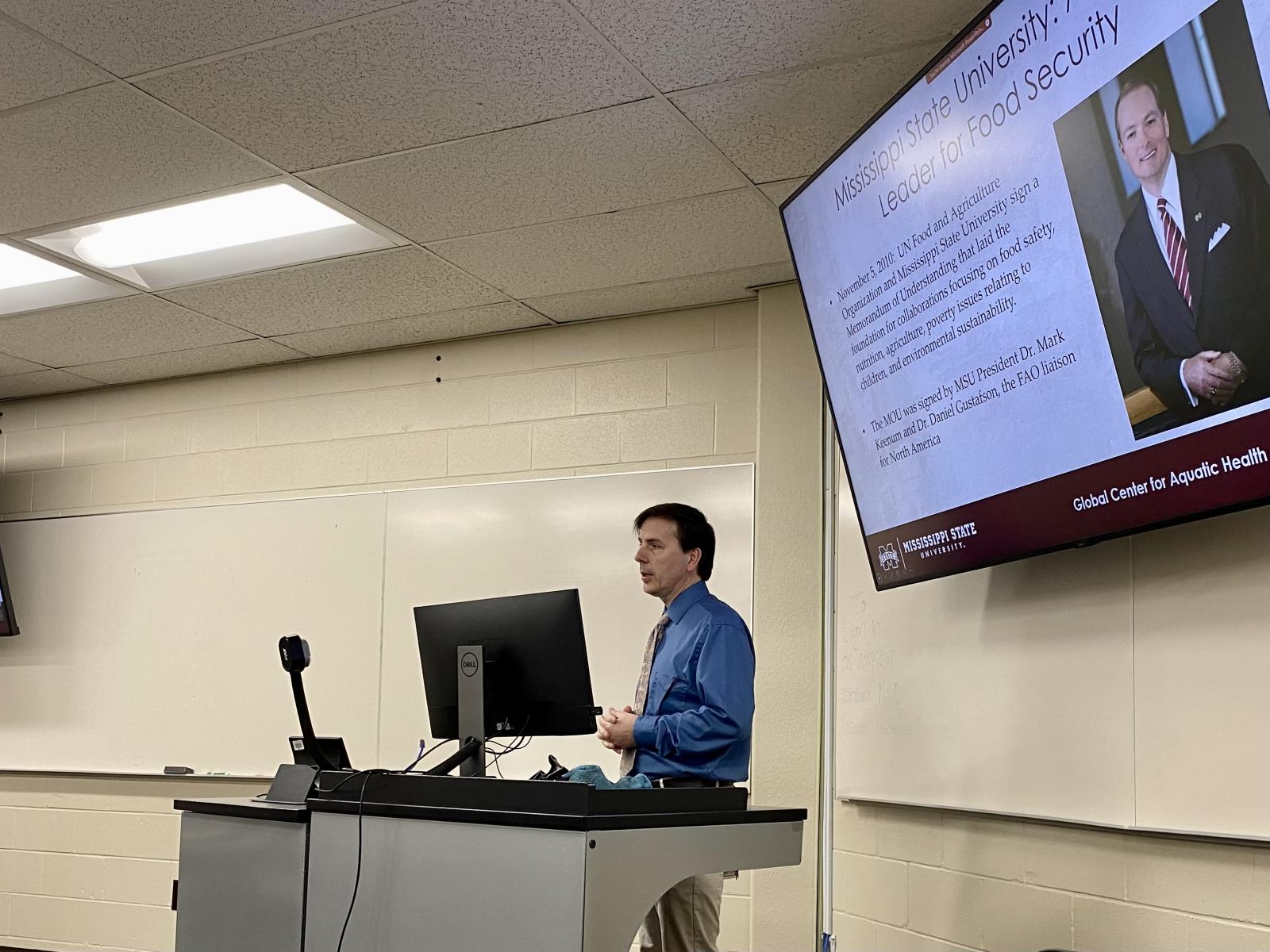
Mark Lawrence spoke during Research Week about the global aquatic research taking place under the Global Center for Aquatic Health and Food Security at MSU. (Photo by Alaina Dismukes)
By Alaina Dismukes
Mississippi State University’s Global Center for Aquatic Health and Food Security (GCAHFS) and the Feed the Future Innovation Lab for Fish participated in MSU’s Research Week, showcasing research to protect marine animals and reduce global hunger through improving aquaculture and fisheries management.
Research Week, a campus-wide event, celebrated and showcased MSU’s research by faculty, staff, and students, which is not only positively impacting people in the state of Mississippi, but also people around the world. During the event, Mark Lawrence, director of the GCAHFS and Fish Innovation Lab and William L. Giles Distinguished Professor in the College of the Veterinary Medicine Department of Comparative Biomedical Sciences, discussed the global aquatic research taking place under the GCAHFS.
In 2013, MSU formed the GCAHFS to stimulate interaction and collaboration among MSU faculty in aquatic animal health, aquaculture, and fisheries for development of scholarly activity, education of students, and promotion of research activities.
The GCAHFS began collaborations with the UN Food and Agriculture Organization (FAO) to promote and engage MSU faculty in international aquatic animal health, aquaculture, and fisheries activities. The goal of FAO is to promote agriculture development globally as well as support livelihoods and nutrition. As a result of this collaboration, President Keenum signed a Memorandum of Understanding with FAO in 2014 in which the GCAHFS was recognized as an FAO Center of Knowledge in Aquatic Animal Health, the first such designation to a veterinary college in the world.
In September 2018, the GCAHFS was awarded the USAID-funded Feed the Future Innovation Lab for Fish. This lab is working in Africa and Asia to alleviate poverty and improve nutrition through nutrient-rich aquatic food sources such as tilapia and oysters among other fish species.
“One of the real areas of need globally that we found, and the FAO had dealt with, is that we have a recurring problem in aquaculture development,” Lawrence said. “Fish is a great food source, but what happens oftentimes with aquaculture in developing countries is the industry will grow rapidly without the parallel development of infrastructure to support fish health.”
In turn, as aquaculture grows without the development of fish health infrastructure, there is a repeating pattern of disease, which either totally collapses the aquaculture industry in the area or severely reduces it.
“Our goal was to help FAO by being proactive in thinking about how we could get ahead of the problem and develop the infrastructure in countries to support the growth of aquaculture,” he said. “The Fish Innovation Lab emerged through some of our experiences and collaborations with FAO, so we competed for and won the Feed the Future Innovation Lab for Fish in 2018.”
The five-year program focuses not only on aquaculture but also includes fisheries. Fish health and biosecurity are important components of the program as well as food safety and nutrition.
“The overarching goal is improved nutrition and livelihoods in developing countries,” Lawrence said. “MSU leads a group of universities in the U.S. to manage this program, but it is a global program. There are many other universities abroad as well as other organizations that are a part of this applied research program, which includes 24 projects in Africa and Asia. Faculty from over six departments across MSU are involved in the management of, or projects funded by, the Fish Innovation Lab.”
Also in 2018, the GCAHFS began its Marine Mammal and Sea Turtle Health, Monitoring, and Conservation Program.
“The GCAHFS partners with the Institute for Marine Mammal Studies in Gulfport, MS,” said Stephen Reichley, GCAHFS Associate Director and Assistant Clinical Professor in the College of Veterinary Medicine Department of Pathobiology and Population Medicine. “We aim to enhance the response to dolphins and sea turtles that strand in the Mississippi Sound, improve our mortality investigations of marine animals, and rehabilitation of critically endangered sea turtles.”
“These programs under the GCAHFS, the Fish Innovation Lab and the Marine Mammal and Sea Turtle Health, Monitoring, and Conservation Program, have a dual mission, both in aquatic health and food security internationally and also in conservation in the Gulf of Mexico and the Mississippi Sound,” Lawrence said. “We look forward to future collaborations with faculty and students to advance work in the areas of aquatic health and food security.”
Published June 13, 2022